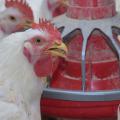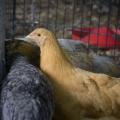Chick removal from hatchery
The time period that is normally recommended between hatching and removal of chicks from the hatching unit or incubator is about 1 to 24 hours.
The earliest elapsed time before removal is usually about 1 hour. The ideal chick must be able to walk well and has dried, fluffy down. If the chick is still wet, it should stay in the hatcher even if all other chicks are ready for removal. A wet chick becomes quickly chilled and often dies soon after removal.
If all eggs do not hatch within 24 hours after the first hatchling emerges, open the hatching unit and remove all dry chicks. Leave wet chicks until they are dry and strong. It is best to remove chicks at 18 to 24 hours intervals after the first chick hatches. If chicks are still hatching when the hatcher is opened, it is important to quickly remove dry chicks and close the hatcher before the humidity drops too low.
The primary reason for not allowing the chicks to stay in the hatcher for longer periods is excess dehydration of the chicks. The chicks have enough food reserves to provide their bodies with nourishment for 3 days. They do not have additional moisture reserves and can become dehydrated if left in the hatcher too long. A dehydrated chick is identified by looking at the scaly portion of the legs (shanks). If the shanks are smooth and rounded, the chick is normal and does not immediately need water. If the shanks are angular and show sharp angles on the front and backs, they are dehydrated and in a stage of stress. Be sure that plenty of cool, fresh drinking water is available in the brooding area.
Additional information on proper incubation practices can be found in Hatching Quality Chicks and Hatchery Management Guide.
Publications
News
STARKVILLE, Miss. -- Until an avian flu vaccine for chickens or other alternative is federally approved, commercial poultry operations in the U.S.
STARKVILLE, Miss. -- If egg prices have seemed higher than ever lately, it’s because they are, and consumers can place much of the blame squarely at the feet of the ongoing bird flu outbreak.
With highly pathogenic avian influenza, or HPAI, in the environment in Mississippi, owners of backyard flocks have to take extra steps to keep their chickens healthy.
Avian influenza poses an extremely low risk to human health and none to food safety in Mississippi, but its presence poses a risk to backyard flocks and the state’s $3 billion commercial poultry industry.







